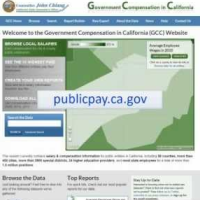State Controller’s Employee Compensation Database Limited by Lack of Transparency

The state’s go-to website for finding out how taxpayer money is spent on government employees prominently displays a “Highest Paid” Top Ten list. Everybody loves a list and it’s good to know that six people on this one are college athletic coaches who each make more than $1.7 million.
But, as The Center for Investigative Reporting (CIR) found out, there’s a lot not to love about the Government Compensation in California site operated by the Office of the State Controller. The interactive database―payroll data from state agencies, cities, counties, courts, education and some other entities―has big gaps and isn’t very transparent.
The database was created a few years ago after a scandal over excessive compensation in the tiny Los Angeles County city of Bell. City Manager Robert Rizzo was getting $1.5 million a year, and his assistant pulled down half a million, including benefits. They both went to jail.
Controller John Chiang said he wanted a comprehensive database that would provide the kind of transparency that would have prevented the Bell scandal. CIR said, so far, he has failed.
For privacy and practical reasons, the database does not identify entries by name. It uses job titles―obscure job titles that make it nearly impossible to identify top executives for purposes of comparison. For instance, San Francisco City Administrator Naomi Kelly might make more than Rizzo (she does not), but she’s off the radar as “Dept. Head V.”
Perhaps more important than not being able to stalk employees from a home computer is the inability to aggregate data because of information gaps. Full-time and part-time employees are not differentiated, so calculating average wages for any grouping is meaningless, if not misleading.
CIR crunched its own independently-obtained numbers and calculated that full-time employees working for the city of San Francisco in 2012 earned $103,000. The Controller’s database says the average worker made $77,000.
Each of the entities feeding data to the Controller uses different titles. CIR noted 33 different ways of saying “city manager” and 41 ways to say “county supervisor.”
Betty Yee, who was elected Controller in November and will take over for Chiang next month, said she doesn’t plan on adding names to the database. “It’s about the position and not the person.”
That is not a settled question. There is a concerted effort to publicly identify public workers and information about them. All the better to hold public employees accountable, identify corruption and more efficiently manage resources. It also helps reduce the power of labor, organized and otherwise.
In the case of teachers, the Los Angeles Unified School District (LAUSD) is striving to list their names, link them to the performance of their students over time and rank them for purposes of compensation. The unions and a lot of other people aren’t crazy about the idea.
Meanwhile, the Los Angeles Times went ahead and compiled years worth of data, did their own “value-added” assessment and published it online. They got some grief for that when a teacher, depressed by his low rating, shot himself to death.
The race is on to get as much data online and accessible as possible. That, of course, does not include the massive amounts of data compiled by data brokers about individuals and sold everywhere without their permission, much less compensation. That information is owned by corporations, where other people’s personal information is their trade secret.
The California Policy Center lists 11 public employee compensation databases besides the State Controller’s site. The best of the bunch appears to be to Transparent California, run by the California Policy Center and Nevada Policy Research Institute, where the curious can hunt Kelly down. Her regular pay in 2013 was $270,641.50 and her total benefits package amounted to $348,509.37. She did not get paid for overtime.
Transparent California say it has data on 5,308,716 employees, and it names names.
–Ken Broder
To Learn More:
California’s Public Payroll Database Falls Short on Transparency (by Joanna Lin, The Center for Investigative Reporting)
Comparing Compensation Information on Transparent California and State Controller’s Site (by Robert Fellner, Union Watch)
Search Government Compensation in California (California Office of the Controller)
Public Employee Compensation Databases (California Policy Center)
- Top Stories
- Controversies
- Where is the Money Going?
- California and the Nation
- Appointments and Resignations
- Unusual News
- Latest News
- California Forbids U.S. Immigration Agents from Pretending to be Police
- California Lawmakers Urged to Strip “Self-Dealing” Tax Board of Its Duties
- Big Oil’s Grip on California
- Santa Cruz Police See Homeland Security Betrayal in Use of Gang Roundup as Cover for Immigration Raid
- Oil Companies Face Deadline to Stop Polluting California Groundwater





